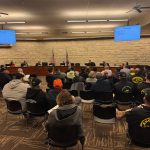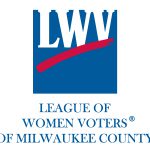Underly Wins Second Term as State Superintendent
Underly defeats challenger Brittany Kinser in hotly-contested race.
Jill Underly won a second term as the head of the state Department of Public Instruction (DPI) Tuesday.
With more than 80% of the vote in, the Associated Press called the race for Underly, who had almost 53% of the vote at the time.
Underly defeated Brittany Kinser, a pro-voucher candidate that identified as a Democrat in the past, but who ran to the right of Underly, courting Republican voters and campaigning with conservative Supreme Court candidate Brad Schimel.
In a victory speech, Underly said her victory was a win for public schools and that upheaval at the federal level is creating new challenges and uncertainty for public school systems. “With the Trump administration hellbent on dismantling the U.S. Department of Education, our role in defending and advocating for public schools becomes even more critical,” she said.
The incumbent ran a campaign in support of greater investment in the state’s public schools and opposing the state’s voucher program, which provides taxpayer funding for students to attend private schools.
Her campaign worked to overcome criticism — including comments from Gov. Tony Evers — of recent changes to standardized testing, which included new terminology, scoring and even a new design for the test. Underly repeatedly defended the changes. Underly also faced charges of hypocrisy from school choice supporters for briefly sending her children to a private elementary school in Madison.
Underly, in a position frequently criticized by Kinser, also declined to appear at several public forums.
The state superintendent is a non-partisan office and up for election every four years. The superintendent serves as the head of the state Department of Public Instruction (DPI), overseeing 421 school districts and state and federal funding for schools. The agency also manages statewide curricula and standardized testing.
Underly was first elected state superintendent in 2021. She replaced Carolyn Stanford Taylor, who was appointed by Evers after he won election to the governor’s office in 2018 while serving as state superintendent; Taylor chose not to run for election to the post. Before winning state office, Underly had spent most of her career in public education, working as a teacher, principal and superintendent. She has also worked as a university administrator, an education consultant and an assistant director at DPI.
Underly’s opponent, Kinser, has varied education experience, including a stint as a teacher in Chicago public schools, as a principal of a Rocketship Charter School in Milwaukee and CEO of City Forward Collective. Kinser faced criticism for lacking any active Wisconsin educational license: she has never held a Wisconsin teacher’s license, and her school administration license has lapsed.
For a state superintendent election, the race drew big campaign spending. The state political parties poured huge amounts of money into the race. By late March, the Democratic Party had provided Underly with $850,000, while Kinser received $1.1 million from the state Republican Party. Kinser also attracted donations from Republican billionaire campaign donors Elizabeth and Richard Uihlein and Diane Hendricks.
In a public statement following her loss, Kinser said she was proud of her “positive, clean campaign.” She also said Wisconsin students deserve a better education system and reiterated her commitment to raising reading proficiency to 95%. She is involved, through her consulting firm, in a reading initiative called Wisconsin 95 that claims the same goal.
Kinser also needled Underly one final time for the testing standards controversy.
“I hope that my candidacy has inspired conversations about the importance of restoring high standards and ensuring every child can read, write, and do math well, so they have the opportunity to go to college, secure a meaningful job, or master a trade,” Kinser said. “We know that our children meet expectations when standards are set high.”























It is deeply disappointing that Jill Underly won this election. Now, even more MPS students will not be able to read at grade level–or barely at all. More financial disasters will go undetected by voters, and more children will end up with lead poisoning in unkept schools. Kinser would have been a breath of fresh air and a chance to take a realistic look at academic performance instead of just changing the testing goal post to hide under-performance. What a shame to see all the lies told about Kinser! I guess Milwaukee voters would rather have students fail than bring in a new face with a better track record.
DPI superintendent has overall accountability for districts throughout the state. However, her responsibility in any one district, such as MPS, is limited. Blaming Underly for MPS’ problems ignores the accountability MPS leaders have to Milwaukee teachers, students, and families. So too, it ignores the level of poverty, homelessness, and food insecurity rampant throughout the district.
Until the Wisconsin legislature addresses the level of poverty–both urban and rural–school districts will be limited in how they are able to address chronic problems. What’s more, the longer we rely on standardized test results to determine success, the longer problems will persist. At least Underly had the wisdom to mold test outcomes to better fit the needs of Wisconsin and its students.
Thank you mkwagner. While Underly has broad responsibility for other districts throughout the state, MPS is the largest and has the most problems–I would think requiring more of her focus. Thankfully, parents in urban districts such as Milwaukee do have the choice to send their children to a public charter school–schools that take students– all of the same students living in poverty with food insecurity and other issues. Poverty in communities and families has long been the excuse of MPS, but the success of public charters in Milwaukee serving these same students continues to demonstrate the innate problems that MPS is failing to address in its administration.
Yes, we do need standardized test scores and once you get away from those, you continue to hide the fact that students are not learning in your classrooms and you hold no accountability for changing things. Lowering the scores only hurts students and their future opportunities. You say ‘molding rest scores,’ I say you are hiding the fact that what you are doing is not resulting in students learning at grade level. Enough with the smoke and mirrors.